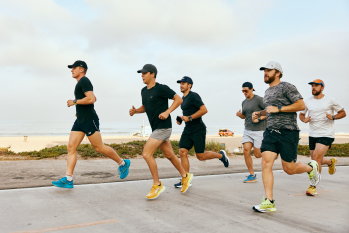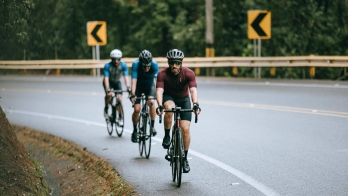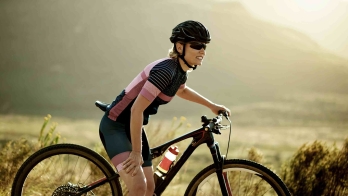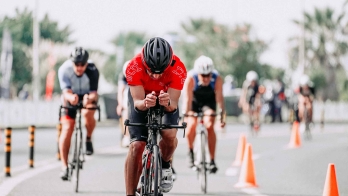Dangerous but legal supplements for cyclists
Cyclists looking to enhance athletic performance may turn to legal dietary supplements. However, legal doesn’t always mean safe. Learn more about what supplements cyclists should be aware of, and the dangers they present.
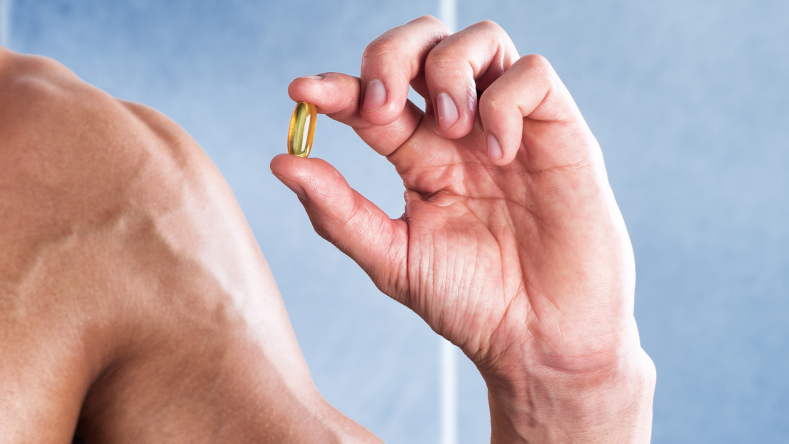
All athletes, including cyclists, constantly strive to improve their performance. While training and fueling are essential for cycling performance, dietary supplements can also play a role and in some cases, offer a competitive edge.
However, legal supplements are not without their adverse effects and risks, and it’s important for every cyclist to understand the benefits and dangers of any supplement they consume.
Before covering the dangers of legal supplements available for cyclists, let’s discuss some differences between illegal performance-enhancing drugs and legal dietary supplements.
What defines legal supplements?
According to the FDA, every dietary supplement needs to be labeled with the term "dietary supplement" or with a term that substitutes a description of the product's dietary ingredient(s) for the word "dietary" [14]. However, federal law states that supplements don’t need to be FDA approved before they are marketed, which means that the manufacturer or seller can add inaccurate or untruthful claims to supplements [14].
This explains the vast number of legal supplements on the market aimed at optimizing athletic performance. Often known as ergogenic aids, these supplements come in many forms and doses, and, since they are not regulated by any governing body, can pose a danger to your health if used incorrectly or not validated by a third party source such as NSF or Informed Sport.
When it comes to banned substances, the World Anti-Doping Agency (WADA) states that anabolic androgenic steroids (AAS), peptide hormones, growth factors, beta-2 agonists, hormone and metabolic modulators, and diuretics and masking agents are prohibited at all times [15]. In addition, each sport and competition level has its own set of prohibited substances, so be sure to check with your related sport to ensure compliance.
Learn more about how to improve your cycling performance with nutrition
here
.

Legal supplements that can be dangerous
Caffeine
Whether in the form of energy drinks, powders, pills, or a regular cup of coffee, caffeine is one of the most common supplements used by cyclists. At healthy doses (less than 400 mg/day), caffeine can improve energy levels, concentration, and athletic performance [1]. However, in higher concentrations (more than 400 mg/day) caffeine can have adverse effects on the cardiovascular system, including heart palpitations, arrhythmias, and elevated blood pressure [2]. High intakes of caffeine can also lead to anxiety, insomnia, restlessness, nausea, headaches, and diarrhea [3].
Cyclists should be especially cautious with energy drinks and caffeine pills, as these supplement forms can contain higher concentrations of caffeine than coffee, which leads to negative side effects if consumed in excess. Energy drinks also often contain other sources of caffeine, such as guarana, which may not be appropriately labeled.
Guarana
Guarana is an herbal supplement often found in energy drinks that contains caffeine-rich seeds. This supplement is said to improve cognition and energy levels in doses of around 200 mg per day, although human studies are limited [7].
In higher doses, guarana can cause stomach pain, increased heart rate and blood pressure, and anxiety due to its high caffeine content [8].
Beta-alanine
Beta-alanine is another popular ergogenic aid for athletes, used to decrease fatigue and improve performance in high-intensity efforts [4]. Beta-alanine is generally safe when consumed in appropriate doses (2–5 grams/day), but can cause paresthesia, or numbness and tingling in the hands and feet when taken in excess [4,5]. This sensation usually dissipates and does not cause long-term issues, but cyclists should still be aware of paresthesia as a potential side effect of beta-alanine supplementation.
Ginseng
Ginseng is an East Asian herb that is commonly taken to enhance physical performance, increase stamina, and reduce stress. Ginseng is also a frequently added ingredient in energy drinks [2].
Studies show that taking this supplement in excess (more than 400 mg/extract/day) may lead to adverse side effects such as diarrhea, headache, dizziness, high blood pressure, insomnia, and irritability, all of which negatively impact athletic performance [2, 6]. Before taking ginseng, consider if the potential benefits based on limited studies are worth the risk of adverse side effects.
Sodium bicarbonate
More commonly known as baking soda, this household staple is used to buffer lactic acid during high intensity exercise and offset fatigue [10].
Sodium bicarbonate is generally considered safe when taken in the recommended dose of 90-135 mg/pound of body weight, however, in larger doses it can produce dangerous side effects. Baking soda is alkaline and can severely increase blood pH, leading to cardiac arrhythmias and muscle spasms [11]. It may also interact with stomach acid, producing abdominal pain, nausea, vomiting, diarrhea, and bloating. In addition, sodium bicarbonate decreases how much iron the body absorbs [16].
The risk of contaminants
Apart from labeled ingredients you may find in legal performance-enhancing supplements, cyclists should be aware that these products are not routinely inspected by the FDA and may contain dangerous contaminants due to lack of quality control. Most commonly, supplements have been found to contain unlabeled allergens, stimulants, estrogenic compounds, diuretics, and even anabolic agents such as illegal steroids [12]. Disturbingly, studies have shown that up to 58% of all legal dietary supplements specifically designed for athletes contain substances prohibited by the World Anti-Doping Code (WADA) [13]. Not only are these contaminants dangerous for health, but they may also lead to positive drug test results for cyclists.
Always make sure your supplements are certified and third-party tested (from
NSF
orInformed Sport
) for harmful and/or illegal contaminants.

Summary
Cyclists hoping to optimize their athletic performance often turn to supplements to give them an extra edge on top of rigorous training and balanced nutrition. However, just because a supplement is legal does not mean it is danger-free. Many commonly used supplements can cause significant adverse side effects and some may even contain allergens or illegal substances.
If you're a cyclist taking supplements, look for the NSF Informed Sport
Disclaimer: The text, images, videos, and other media on this page are provided for informational purposes only and are not intended to treat, diagnose or replace personalized medical care.
Key Takeaways
Many legal supplements come with adverse effects, especially at high doses.
Cyclists should be especially cautious with energy drinks and caffeine pills, as these supplements contain higher concentrations of caffeine than coffee and can lead to negative side effects if consumed in excess.
Supplements have been found to contain unlabeled allergens, stimulants, estrogenic compounds, diuretics, and even anabolic agents such as illegal steroids [10].
Always make sure your supplements are certified and third-party tested (from
NSF
orInformed Sport
) for harmful and/or illegal contaminants.
References
Smirmaul, B. P., de Moraes, A. C., Angius, L., & Marcora, S. M. (2017). Effects of caffeine on neuromuscular fatigue and performance during high-intensity cycling exercise in moderate hypoxia. European journal of applied physiology, 117(1), 27–38.
https://doi.org/10.1007/s00421-016-3496-6
Wassef, B., Kohansieh, M., & Makaryus, A. N. (2017). Effects of energy drinks on the cardiovascular system. World journal of cardiology, 9(11), 796–806.
https://doi.org/10.4330/wjc.v9.i11.796
Edenfield, K. M. (2020). Sports Supplements. Primary Care: Clinics in Office Practice, 47(1), 37–48.
https://doi.org/10.1016/j.pop.2019.10.002
Brisola, G. M. & Zagatto, A. M. (2019). Ergogenic Effects of β-Alanine Supplementation on Different Sports Modalities: Strong Evidence or Only Incipient Findings?. Journal of Strength and Conditioning Research, 33 (1), 253-282. doi: 10.1519/JSC.0000000000002925.
Dolan, E., Swinton, P. A., Painelli, V. S., Stephens Hemingway, B., Mazzolani, B., Infante Smaira, F., Saunders, B., Artioli, G. G., & Gualano, B. (2019). A Systematic Risk Assessment and Meta-Analysis on the Use of Oral β-Alanine Supplementation. Advances in nutrition (Bethesda, Md.), 10(3), 452–463.
https://doi.org/10.1093/advances/nmy115
Lee, N. H., Jung, H. C., & Lee, S. (2016). Red Ginseng as an Ergogenic Aid: A Systematic Review of Clinical Trials. Journal of exercise nutrition & biochemistry, 20(4), 13–19.
https://doi-org.ezproxy.cul.columbia.edu/10.20463/jenb.2016.0034
Pomportes, L., Brisswalter, J., Hays, A., & Davranche, K. (2019). Effects of Carbohydrate, Caffeine, and Guarana on Cognitive Performance, Perceived Exertion, and Shooting Performance in High-Level Athletes. International journal of sports physiology and performance, 14(5), 576–582.
https://doi-org.ezproxy.cul.columbia.edu/10.1123/ijspp.2017-0865
Dorneles, I. M., Fucks, M. B., Fontela, P. C., Frizzo, M. N., & Winkelmann, E. R. (2018). Guarana (Paullinia cupana) presents a safe and effective anti-fatigue profile in patients with chronic kidney disease: A randomized, double-blind, three-arm, controlled clinical trial. Journal of Functional Foods, 51, 1–7.
https://doi.org/10.1016/j.jff.2018.10.004
Santana, Á. L., & Macedo, G. A. (2018). Health and technological aspects of methylxanthines and polyphenols from guarana: A review. Journal of Functional Foods, 47, 457–468.
https://doi.org/10.1016/j.jff.2018.05.048
Grgic, J., Rodriguez, R. F., Garofolini, A., Saunders, B., Bishop, D. J., Schoenfeld, B. J., & Pedisic, Z. (2020). Effects of Sodium Bicarbonate Supplementation on Muscular Strength and Endurance: A Systematic Review and Meta-analysis. Sports medicine (Auckland, N.Z.), 50(7), 1361–1375.
https://doi-org.ezproxy.cul.columbia.edu/10.1007/s40279-020-01275-y
Al-Abri, S. A., & Olson, K. R. (2013). Baking soda can settle the stomach but upset the heart: case files of the Medical Toxicology Fellowship at the University of California, San Francisco. Journal of medical toxicology : official journal of the American College of Medical Toxicology, 9(3), 255–258.
https://doi.org/10.1007/s13181-013-0300-4
Deldicque, L. , Francaux, M. & (2016). Potential harmful effects of dietary supplements in sports medicine. Current Opinion in Clinical Nutrition and Metabolic Care, 19 (6), 439-445. doi: 10.1097/MCO.0000000000000321.
Helle, C., Sommer, A. K., Syversen, P. V., & Lauritzen, F. (2019). Doping substances in dietary supplements. Dopingmidler i kosttilskudd. Tidsskrift for den Norske laegeforening : tidsskrift for praktisk medicin, ny raekke, 139(4), 10.4045/tidsskr.18.0502.
https://doi-org.ezproxy.cul.columbia.edu/10.4045/tidsskr.18.0502
U.S. Food and Drug Administration. (2015). FDA 101: Dietary Supplements.
https://www.fda.gov/consumers/consumer-updates/fda-101-dietary-supplements
What is Prohibited. World Anti-Doping Agency. (n.d.). https://www.wada-ama.org/en/content/what-is-prohibited/prohibited-at-all-times/peptide-hormones-growth-factors-related-substances-and-mimetics.
O'Neil-Cutting, M. A., & Crosby, W. H. (1986). The effect of antacids on the absorption of simultaneously ingested iron. JAMA, 255(11), 1468–1470.

